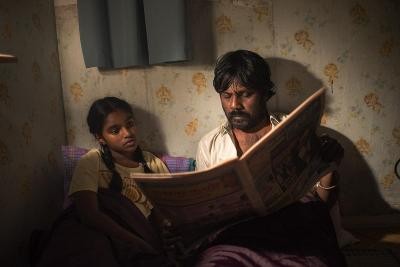Amir continues our coverage of TIFF '15 with a review of this year's Palme d'or winner, Jacques Audiard's Dheepan.

Whether Jacques Audiard’s latest film, Dheepan, benefits from the pedigree of its Palme d’or or becomes victim to raised expectations isn’t clear. What is already clear, however, is that the film’s reception has been truly baffling: on the one hand, the Cannes prize is one of the festival’s more curious decisions; on the other, the extent of vitriol that the film receives seems equally unwarranted. Dheepan is on the same emotional and stylistic wavelength as Audiard’s previous films, and it is about ten minutes -- admittedly a disastrous ten minutes — away from being on par with his best work...
The story revolves around three Sri Lankan refugees, who escaped civil war in their home country to reside in the notorious suburbs of Paris. Dheepan (Jesuthasan Antonythasan), Yalini (Kalieaswari Srinivasan) and Illayaal (Claudine Vinasithamby) are not a family, but pretend to be husband, wife and daughter to gain political asylum. The titular character finds work as a caretaker in a residential complex that houses violent gangs. It’s an environment not entirely unlike the war zone from which they’ve fled.
Much of the strength of the film lies in its universality. It’s a particularly timely film, as the refugee crisis rages on in the real world, and Dheepan isn’t particularly tied to the specifics of Parisian neighborhoods or Tamil tigers. The story of this immigrant “family” is moving precisely because it relatable irrespective of the details. In its best moments, Audiard’s film is tense and heartbreaking. Antonythasan and Srinivasan both deliver remarkable performances, deftly portraying the balance of vulnerability and defiance that their characters embody in their new home.

What works to the film’s detriment is Audiard’s insistence on weaving the family’s narrative to the minutiae of the violence engulfing them. Some of these connections are simply nonsensical—Dheepan is threatened in one intense and seemingly momentous scene by a Tamil warlord, for example, but the subplot is never revisited—and others are merely muddled. All of their conflicts with the gang members build up to a violent breakout near the film’s end, a shrill, amateurishly stylized sequence that diminishes the film’s emotional impact. Audiard’s attempt to rectify this digression makes matters even worse, when the complexity of the story is diluted through rose-tinted glasses. It’s a misstep entirely uncharacteristic for a filmmaker who’s built a career from melodramatic treatments of tough subjects, and one that unfortunately ends Dheepan on an unsatisfying note.